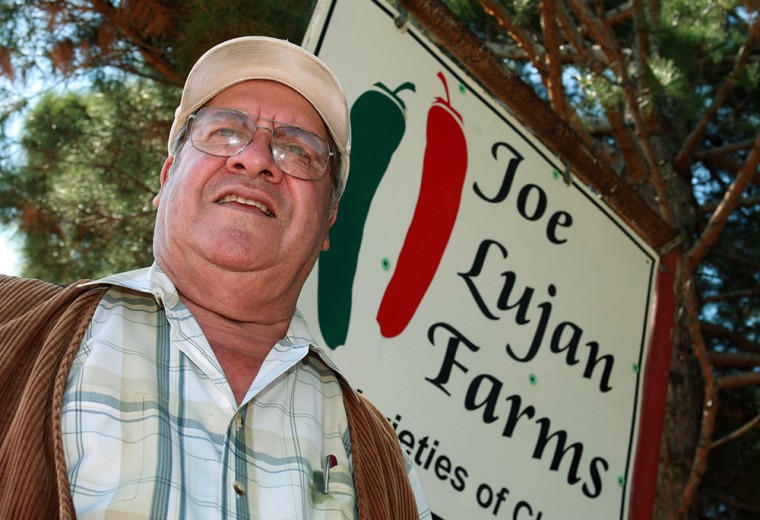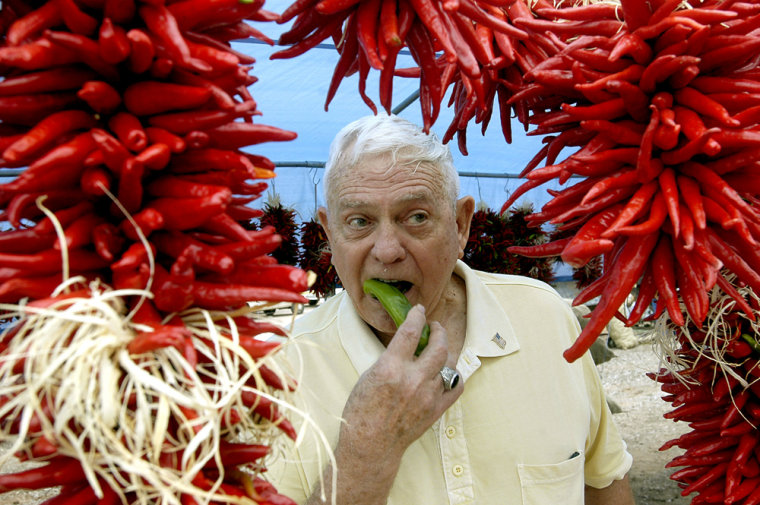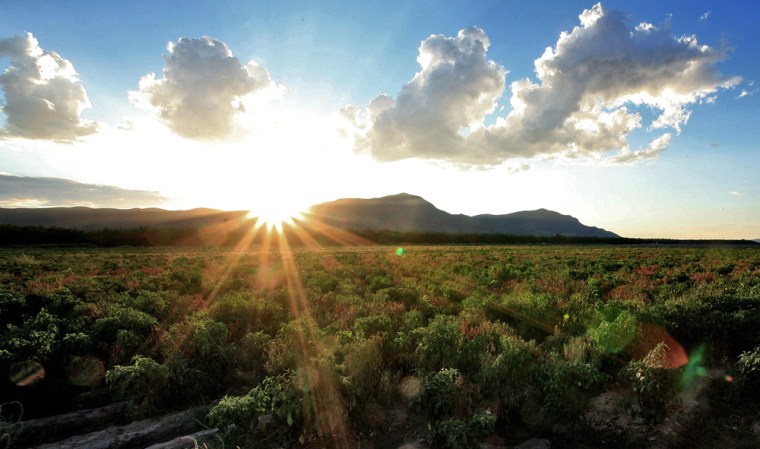In some parts of the country, a balmy September afternoon might be spent picking pumpkins or apples.
But in this corner of New Mexico, people have flocked to Joe Lujan's "you-pick" farm in Las Cruces for the past 45 years to hand-pick chili peppers.
Nestled between pecan groves and surrounded by desert, Joe Lujan Farms is 40 acres filled with five varieties of chili as well as squash, okra, onions, tomatoes, jalapenos, cucumbers and a small pecan orchard.
Between August and October, the farm bustles with customers either out in the fields or milling around the farm store, chatting as they wait for the fruits of their labor to be roasted and packed.
Farmer Joe Lujan, 75, greets customers with a handshake or hug, asking about their family and health as he makes his way around the store. His wife, Martha, seems to know every person who comes in to register, while farm dogs Buddy and Bandit soak up frequent pats and head scratches.
Besides the friendly conversation and relaxing atmosphere, Lujan said his farm offers customers something they won't find at a grocery store: freshness and selection.
"They see where it's grown with their own eyes and pick it with their own hands. They don't need a sign in a store to tell them how fresh it is," Lujan said.
For some families in this part of the country, eating chili is a daily ritual. And Lujan has many customers who come religiously each year throughout the season to stock up.

"We've got to have our chili — it's our staple," said Rosalinda Martinez of Alamogordo, who buys four 50-pound bags of hot green chili from the farm every year.
A sweet and spicy, pungent aroma fills the air as the picked green chili is roasted outdoors on site. Pounds of chili peppers are placed in a large, metal mesh barrel which rotates horizontally over a propane-fueled flame for about five minutes. The flame blackens the chili skin, or peel, which is removed before the pepper is used in sauces, stews or simply eaten whole.
Martha Lujan said on average the farm sells roughly 12,000 pounds of chili per acre, with most sales generated through word of mouth and repeat customers. Those who can't make it here to pick their own can order it sent to them. The farm has shipped pre-ordered 30-pound boxes of fresh or frozen green chili to customers in every state in the country.
Joe Lujan said his family started the "you-pick" business model to save on labor costs, which can be especially tough for small farmers. The farm used to have 100 acres contracted to a food production company in California, but Lujan said he stopped a decade ago because the company "wouldn't pay us what we needed to break even and make a little money."
"The 'you-pick' is the reason I've been able to do this for so long," he said, gesturing to the customers in the field.
New Mexico has a small number of "you-pick" farms across the state, offering customers everything from apples to raspberries to pumpkins.

Most successful "you-pick" farms are located near large cities, offer more than one commodity and have staggered plantings in order to keep a steady flow of customers, says Terry Crawford, an agricultural business professor with New Mexico State University in Las Cruces. Crawford said less than 5 percent of the chili production in New Mexico goes into the fresh market, including the peppers sold at commercially grocery stores. The majority of the chile acreage in the state is contracted out to processing plants.
"Most people who go out to pick fruits and vegetables use it as a recreational activity, so you'll get all kinds of customers on the weekend and no one on Wednesday," Crawford said. "It's a cheap way to get exercise, entertainment and food with little cost. The trick is getting the customer to come out and pick versus when the crop is actually ready."
In addition to several chili roasting and packing employees, Lujan has hired a small crew of chili pickers to harvest the fields regularly to avoid sacrificing his yields. This allows the farm to sell already picked chili and vegetables to customers who'd rather not venture into the field.
Lujan says he stays in the farming business because of tradition and those closest to his heart. Joe and Martha's youngest daughter, Lucinda, and her daughter Amanda live and work on the farm. Joe said anytime he gets discouraged, he remembers how much his grandchildren enjoy the farm.
"Farming," he said, "is a family tradition."
